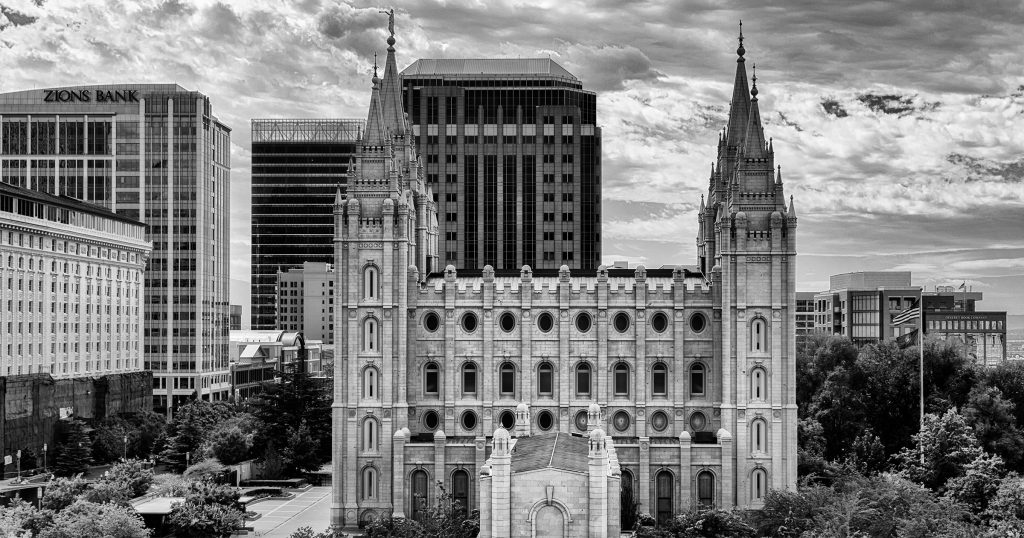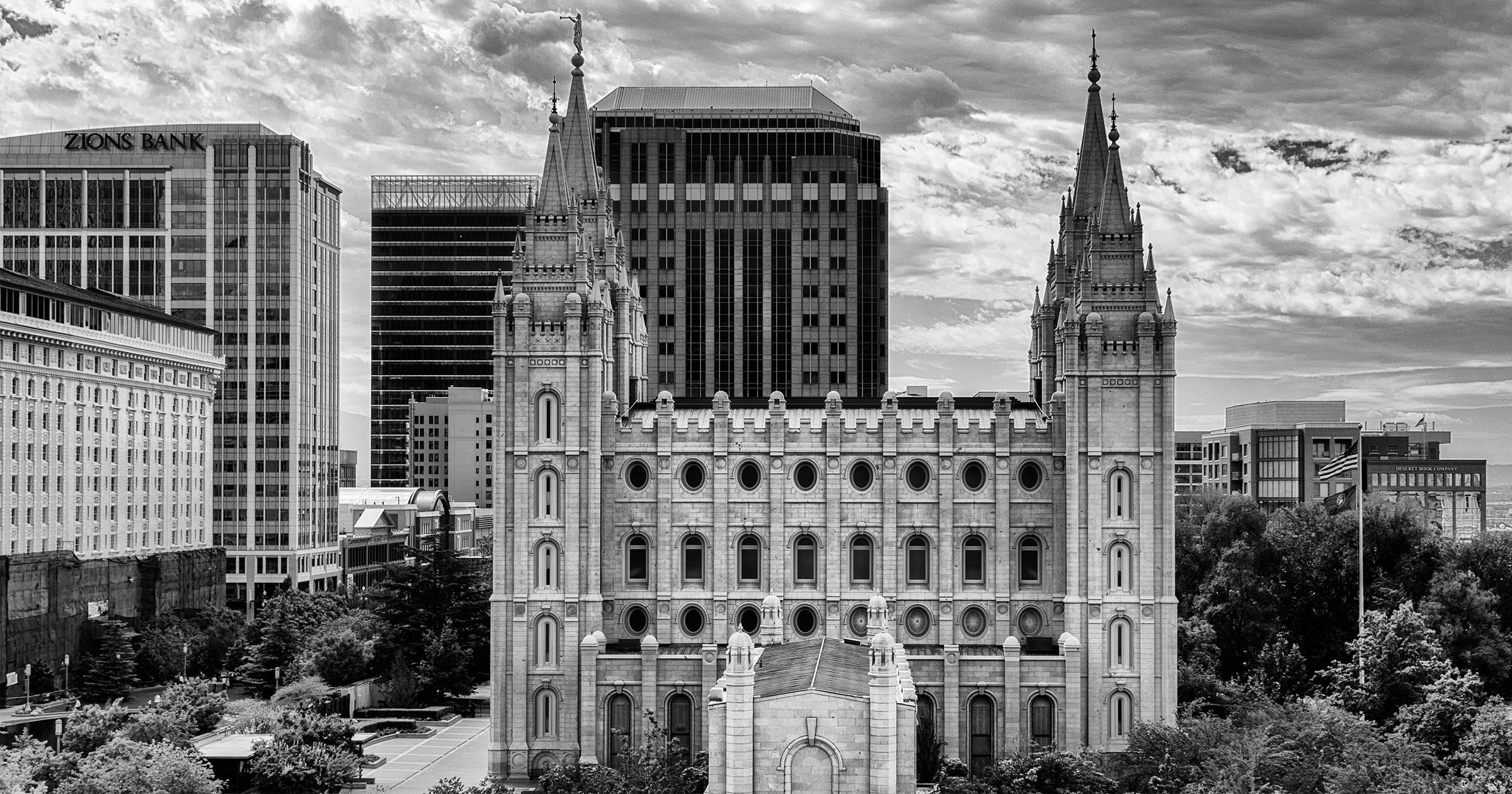PBS Documentary Describes the Gay Mormon Experience, LDS Authoritarianism
by Seba Martinez
“It is a great failure that the family can only be the family almost by the Ozzie and Harriet definition, and anything outside of that is not a family at all.”
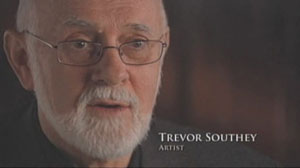 Artist Trevor Southey, feminist Margaret Toscano, and historian D. Michael Quinn were three of the people featured in the documentary The Mormons recently aired by PBS. The documentary, along with many of the interview transcripts, can be viewed at www.pbs.org.
Artist Trevor Southey, feminist Margaret Toscano, and historian D. Michael Quinn were three of the people featured in the documentary The Mormons recently aired by PBS. The documentary, along with many of the interview transcripts, can be viewed at www.pbs.org.
Renowned artist Trevor Southey talked about his experience as a Mormon man who, despite being gay, married and had children in an attempt to fit into Mormon culture. Some of Southey’s remarkable paintings were prominently featured throughout the documentary.
“Being gay in that culture is beyond hell,” said Southey. “When I went to those counselors I wanted to be cured so badly, I fasted and I prayed, and I went through this whole thing. And I remember dating girls, and nothing worked. And then I just decided, ‘This year I’m going to do it.’ And that’s how I ended up marrying—within two and a half months of meeting my poor, unfortunate wife.”
“We were determined to make [the marriage] work,” said Southey. “We bought this paradisiacal place in Alpine, Utah. I had everything I wanted: a stream running through this place, great big cottonwood trees, an old log cabin with a big cobblestone room attached to it. We built, and built, and built, and turned this little place into a paradise. And gradually these children come on to the scene. And it’s heaven for them, an acre and a third to run wild on. And gradually, I gradually realized that I had paradise, but I was an arid desert in my heart. I’d wake up every day of my life thinking —and this phrase would just run through my head—‘And shot himself through the head.’ And it made no sense but it made every sense. There was no running away from it — that I was committing that kind of a spiritual suicide.”
“The moment the infidelity occurred, that was it—the marriage was over and the excommunication process started. So there I was, standing on the grass by the stream, when [my wife] told me that she had gone to the bishop and there was no future there…. I was standing on this stage, in effect, that I had created, but it wasn’t an act, it wasn’t a play that was built for me.”
“There’s something terribly tragic that not only Mormons, but most religions have such a hard time with the odd ducks. The bottom line is that most of us are odd to a greater or lesser extent. And embracing the odd duck to me is the measure of true religion. True religion says, ‘You’re weird, but I love you nonetheless.’ That’s what Jesus would have done. So for me it is a great failure that the family can only be the family almost by the Ozzie and Harriet definition, and anything outside of that is not a family at all.”
“I have no bitterness towards the Church—which surprises me. I loved it dearly and I still love it. I love Mormon people, I love the notions of Mormonism, the teaching that you are an eternal soul, you came from Heavenly Father and you’re here because our family was meant for you. It makes me terribly sad at times that I can’t be in that place.”
Margaret Toscano Describes the Experience of Being Excommunicated
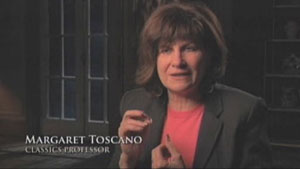 An instructor of classics and an author on Mormon topics, Margaret Toscano talked about her experiences being excommunicated from the Church. Toscano was disciplined for writing about women and the priesthood and the Mormon concept of Heavenly Mother.
An instructor of classics and an author on Mormon topics, Margaret Toscano talked about her experiences being excommunicated from the Church. Toscano was disciplined for writing about women and the priesthood and the Mormon concept of Heavenly Mother.
“I am Mormon on a deep level,” said Toscano. “And I do not believe that a community can be spiritually healthy when it silences people. That was my reason for not obeying the stake president in the first place. I told him at the time; I said, ‘I cannot be silent, because for me to be silent is to participate in an abuse of authority and to damage the community that I care about.’”
“You have to imagine, when you a church disciplinary court, that you go in by yourself—You’re not allowed to bring anybody with you. So I’m in there, and there are 16 men that I am facing.”
“The stake president was presenting the case against me, and he did it in almost courtroom-like fashion. He had a set of notes, and he had his reasons why I should be excommunicated. He also had a stack of copies of everything that I had written, and it was kind of like just a stack.”
“Then the stake president was saying that all I had written about women in the priesthood was really wrong, and I tried to come in to defend myself doctrinally by quoting Joseph Smith and by using argument and reason. In the middle of the sentence, the stake president interrupted me, and he said: ‘We will not allow you to lecture us. We will not allow you to use this kind of reasoning again. You’re only allowed to speak as we give you permission.’ And of course I just kind of stopped mid-sentence. I couldn’t go on, but you can imagine that this was—I mean, you don’t really feel like you have much of a defense.”
“Then they asked me to go out, and they deliberated for about 20 minutes and then brought me back in. I sat back down on the chair, and the first thing that the stake president said to me is, he said, ‘I want you to know that the high council was very impressed with you.’ [Laughs.] ‘However, you are excommunicated. We have found you to be an apostate.’”
“And everybody got up, and they all wanted to shake my hand. They’re cutting me off from eternal salvation and telling me that I’m this apostate, which really is considered very bad in Mormon culture, and then I’m this nice woman that they’re going to shake my hand. There’s something vicious about niceness that struck me in this—that the niceness covered over the violence of what was being done, because, in fact, excommunication is a violent action.”
Michael Quinn Discusses the Tragic Loss of Family Bonds
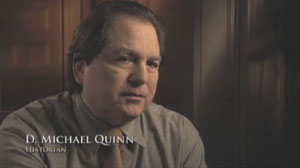 During a part of the interview not included in the documentary, but posted on the PBS website, historian D. Michael Quinn, a gay Mormon man, talked about the breaking up of families that sometimes occurs when a LDS family find out that a loved one is gay.
During a part of the interview not included in the documentary, but posted on the PBS website, historian D. Michael Quinn, a gay Mormon man, talked about the breaking up of families that sometimes occurs when a LDS family find out that a loved one is gay.
“LDS families are in this double bind,” said Quinn, “because they’re told when they have gay children, follow that which is true. Avoid even the appearance of evil, and homosexuality is evil. So there has been almost a kind of expectation that if your child will not conform, then you should abandon them. And yet many families find this extremely difficult to do — not only the physical abandonment, but to give up the faith that this child, this homosexual child, and maybe his partner or her partner for life, may want to be with that family eternally. It creates this huge faith disjunction.”
“You have to develop a private faith, which I have, that God accepts all loving relationships. But this separates you from the orthodoxy of the Mormon Church, and many gays and lesbians cannot make that step. They accept themselves as inferior eternally, because they’ve never been taught otherwise, and they don’t have the individual testimony that I do. Maybe I’m wrong, but this is my faith. So for the mass of Mormon families this is an unresolvable tragedy.”
